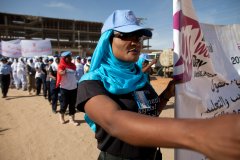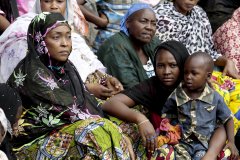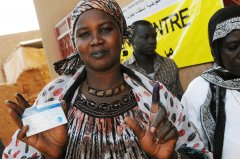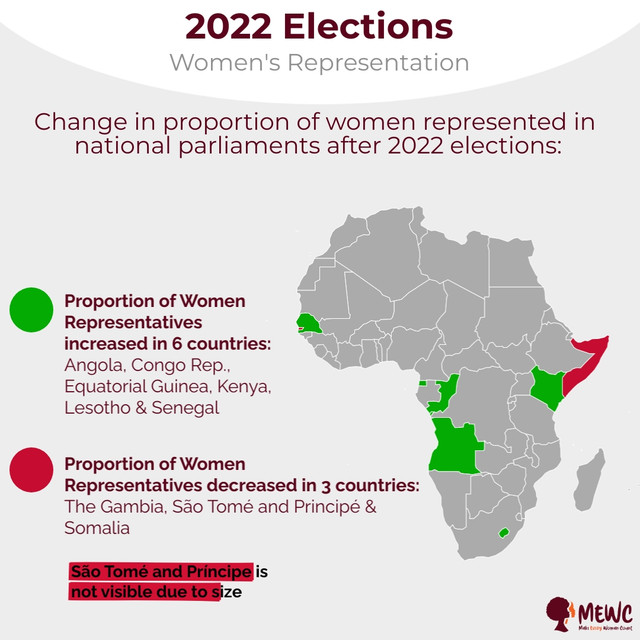Gender Issues Showlist
Women, Peace & Security
UNSCR 1325 calls on all parties to: protect and respect the rights of women and girls in conflict & post-conflict; increase women participation in all conflict resolution, peacekeeping and peace-building & to end impunity by prosecuting perpetrators of sexual and other violence on women and girls
index.php?option=com_content&view=category&id=56&Itemid=1913
Human Rights of Women
Thirty six years after the adoption of CEDAW, many women and girls still do not have equal opportunities to realize rights recognized by law. Women are denied the right to own property or inherit land. They face social exclusion, “honor killings”, FGM, trafficking, restricted mobility, early marriage,...
index.php?option=com_content&view=category&id=44&Itemid=1908
Violence Against Women
Violence against women is the most shameful human rights violation. Gender based violence not only violates human rights, but also hampers productivity, reduces human capital and undermines economic growth. It is estimated that up to 70 per cent of women experience violence in their lifetime
index.php?option=com_content&view=category&id=69&Itemid=1912
Political Participation & Leadership
Where women are fully represented, societies are more peaceful and stable. Women political participation is fundamental for gender equality and their representation in positions of leadership must be a priority for all Africans governments.
index.php?option=com_content&view=category&id=65&Itemid=1911
Latest News
- COTE D'IVOIRE: South-South Meeting to Promote Gender Equality and Combat Deforestation
- RWANDA: Rwanda Set to Launch Cervical Cancer Elimination Plan
- NIGERIA: Over 5,000 Nigerian Women Stranded in Iraq - Govt
- SUDAN: Healthcare Collapse Threatens Pregnant Women in Sudan's Sharg El Nil
- GHANA: President Nominates 12 More Ministers
- Senegal: Parliamentary election 2024
- Mauritius: Parliamentary election 2024
- Ghana: Presidential and Parliamentary Elections
- Botswana: Parliamentary elections 2024
- Algeria: Presidential Election 2024
CAMPAIGN: MALI CALL TO ACTION: New Leadership for the HIV Response
Source: What About HIV?
In this Call to Action, we are not making recommendations; these are demands from young people who are already leading the AIDS response in their communities. To transform the HIV response, we need transformative leadership. We are young people who know the realities of our peers and the challenges they face, but we are also young people with the potential to bring about sustainable change.
Nevertheless, our efforts alone are clearly not enough. It is also clear that many governments have yet to deliver on the Declaration of Commitment on HIV/AIDS approved by the 2001 United Nations General Assembly Special Session on HIV/AIDS and the 2006 Political Declaration on HIV/AIDS. If we are ever to achieve the vision of zero new HIV infections, zero AIDS-related deaths and zero stigma and discrimination, governments must acknowledge and reaffirm these unmet commitments and ensure that updated commitments are fulfilled.
Therefore, we the young people of the Mali Youth Summit on HIV/AIDS, working with and representing diverse youth networks from around the world, including young key affected populations,[1] call on heads of states and governments and all leaders to empower young people to take leadership of the AIDS response to:
- implement United Nations General Assembly Resolution 58/133 which calls on Member States to include young people as part of official delegations to relevant United Nations and regional General Assembly meetings and related activities, and take part in preparation and negotiations, including the 2011 United Nations General Assembly High Level Meeting on AIDS;
- create formal spaces for young key affected populations, specifically young people living with HIV, at the highest level of decision-making by giving them priority in community, national, regional and global decision-making bodies, from conceptualization through design, implementation and monitoring and evaluation of policies and programmes;
- create and institutionalize and support the capacity-building of youth bodies within the national and local AIDS coordinating forums at which youth leaders can receive legitimacy from and be able to provide feedback to the constituency of young people;
1) Secure resources and funding to support new youth leadership for a sustainable HIV response
- ensure core funding for programming and research for youth-led movements and initiatives, accompanied by necessary capacity-building for achieving the Millennium Development Goals;
- support the sustainable involvement of young people in decision-making regarding funds allocated to the AIDS response, especially young key affected populations;
- implement transparent monitoring and evaluation mechanisms for governments’ financial commitments to HIV and AIDS, including ensuring sufficient domestic resources for HIV and young people’s needs in this context, following the example of the commitment of the Abuja Declaration on HIV/AIDS, Tuberculosis and Other Related Infectious Diseases to allocate 15% of the national budget to HIV and broader health needs;
2) Protect and promote human rights to eliminate stigma and discrimination from legal frameworks
- fully repeal punitive and discriminatory national laws, policies and practices, specifically those that target young key affected populations such as young people who use drugs, young men who have sex with men, young people living with HIV, young transgender people and young sex workers;
- remove barriers such as arbitrary age restrictions and mandatory parental consent that restrict access to harm reduction services for young key affected populations, including access to needle and syringe programmes, opiate substitution therapy and treatment services that are based on evidence and human rights for young people who use drugs;
- uphold, domesticate and implement the commitments made in international human rights instruments, including the Universal Declaration of Human Rights and International Covenant on Economic, Social, and Cultural Rights that recognize young people’s rights to non-discrimination, education, the highest standard of health and gender equality;
- take action to ensure a human rights–based approach to issues that put adolescents and young key affected populations most at risk, with a particular focus on passing progressive laws and updating policies and laws that may restrict young people’s access to HIV prevention, services, treatment, care, support and commodities.
3) Deliver HIV information and services that meet the diverse needs of young key affected populations
- collect strategic age-disaggregated data for informed planning and programming, including data for the age groups 15–24 and 25–34 years, sex, marital status and other relevant indicators for young key affected populations;
- involve young key affected populations in designing, implementing and evaluating comprehensive and confidential health services, including both HIV and sexual and reproductive health services for young people in both urban and rural areas, with particular focus on access to treatment for young people living with HIV;
- ensure young people’s access to evidence-informed prevention tools, including, but not limited to, condoms, comprehensive and targeted sexuality education inside and outside schools, peer-to-peer education, harm reduction programmes and access to antiretroviral therapy as prevention, acknowledging the specific needs of young key affected populations; and
- sustain and increase funding mechanisms specific to and led by young people, including seed grants and acknowledging best practices, such as the HIV Young Leaders Fund.
We, the young people of the Mali Youth Summit on HIV/AIDS, pledge to:
- build and strengthen the capacity of youth leaders and youth organizations through mentorship, global, regional and local partnerships, information sharing and networking;
- mobilize our global and local networks and stakeholders through online and offline mechanisms, including social media, to lead the global HIV response;
- hold governments accountable to their commitments;
- use this Call to Action at the United Nations General Assembly High Level Meeting on AIDS and other high-level meetings related to achieving the Millennium Development Goals.
We accept the responsibility we have as young leaders and pledge to hold ourselves accountable to the same degree that we will hold you accountable.
[1]“Young key affected populations” is defined as: young people living with HIV; young men who have sex with men; young women; lesbian, gay, bisexual, transsexual and queer youth; young sex workers; young people who use drugs; young migrants, refugees and internally displaced people; young people in detention; indigenous young people; and young people with disabilities.





